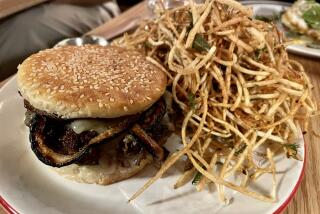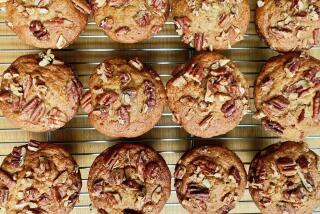Muffin Madness : Health Conscious Snackers StirUp New Yen for Old Favorite
- Share via
Once upon a time, John Donohoe would have chosen a doughnut or a chocolate chip cookie for a mid-morning energy boost. No more. Now he is likely to munch on a muffin, indulging his health concerns as much as his taste.
“I know in past years I went for sweeter things,” Donohoe said as he snacked at the Muffin Oven in Beverly Center. “I think people are more health-conscious in general.”
Donohoe, who operates an import company, is among a rising number of Westside residents who have returned to an old standby in their search for a healthier alternative. On the leading edge of a national trend, they are creating a renewed demand for muffins, a food that used to be a staple in a traditional American diet.
But today’s muffins aren’t necessarily the corn or blueberry confections that Mother used to make. Variety is the spice of today’s muffin business. Spurred by public perception--deserved or not--of the product as wholesome and healthy, new muffin stores are competing against bakeries and established food chains in making new and exotic varieties.
101 Varieties
At Mikey’s Cookies on Santa Monica Boulevard, 101 varieties of muffins are sold, including sugar-free almond granola, date nut and butter rum. Muffin Oven, a four-store Westside chain, introduced oat-bran muffins three months ago to cash in on the popularity of the cholesterol-reducing fiber. Even Debbi Fields of Mrs. Fields Cookies, the empress of cookie vendors, said she hopes to have muffins in all of her stories within the next month.
Industry observers attribute the popularity of muffins to the fact that they fit well into the fast-paced, health-conscious, yuppie life style. “You can eat it on the run. You can get good, high-quality muffins. And right now, anything that fits their life style is profitable,” said Peggy Hoffman, communications director for the Retail Bakers of America, a trade association.
John McMillin, a food industry analyst with Prudential-Bache Securities, summed it up this way: “There’s nothing more the consumer wants than convenience, taste and nutrition. It’s seldom a category has all three, but muffins have all three.”
All of which pleases Amy Rosenberg, who picked up an apple-and-nut muffin at Mikey’s for breakfast on the way to her job at an advertising agency. “For breakfast it’s very light. It’s tasty, and, as far as I know, not too fattening,” she said.
Cathy Probst, a secretary and part-time student, said she thought muffins were “sort of dietetic.”
“They’re substantial and they really fill you up,” Probst said as she finished a sugar-free muffin. “They may have some tie to the past, just like cookies do. Mom used to make them.”
Heavy Sales
Such attitudes translate into heavy sales in the muffin market as specialty food stores jockey with traditional bakeries, health food stores and national chains for business. Although specific figures for muffin sales aren’t available, muffins and bagels combined make up the fastest-growing segment of retail bakery sales, expected to total $12.7 billion this year, up from $10 billion in 1987, said Hoffman of the Retail Bakers of America.
Nowhere is this trend more obvious than the Westside. “People are really into the health thing, especially in the West L.A. area,” said Ray Polk, manager of Mikey’s Cookies.
The store benefits from its location below a tanning salon, whose clients often stop in for sugarless, egg-less muffins, Polk said.
Muffin Oven, a 4-year-old chain, sells an average of 600 muffins per store each day, a 20% increase since the store began making oat-bran muffins three months ago, said Madeline Bohbot, manager of the chain.
At Elysee Bakery in Westwood, muffin sales have doubled in the last six months to between 40 and 50 per day, according to owner Nercy Manzoor.
Manzoor cited the low price of his bran muffins--75 cents apiece--as a reason for their popularity. Mikey’s charges between 90 and 99 cents, depending on the muffin. Muffin Oven charges $1.19 for regular muffins and $1.29 for the oat-bran.
The success of specialty muffin stores and bakeries is bringing them competition from big chains. Winchell’s Donuts has placed muffin ovens in 40 of its 350 Southern California stores and began providing 7-Eleven Stores with muffins earlier this year, said James Verney, company president.
“Muffins appear to be the product of the ‘80s and ‘90s,” Verney said. The chain’s doughnut sales have been decreasing for the last two years, he added.
For Mrs. Fields Cookies, the addition of muffins allows the stores to do early-morning business, Debbi Fields said. The chain plans to add an oat-bran muffin soon to its line, which includes raspberry, blueberry, mandarin orange and bran-raisin, she said.
A Snack or Meal
“Muffins can be perceived as a bakery item, and they are seen as a meal,” Fields said. “Muffins can also be a snack or a dessert. Muffins are perceived as good for you.”
However, muffins are not necessarily healthy, nutritionists warn. The much-ballyhooed value of oat bran in reducing cholesterol can only be received if the muffin has not been made with whole eggs or fatty oils.
“You need to be very careful,” said UCLA dietitian Lauri Byerly. “Ask carefully what it’s made from. . . . As I understand it, muffins are fairly high in fat.”
For the health-conscious, some shops are offering muffins made without eggs, sugar or salt. But most muffin recipes call for sugar, flour, oil, eggs and milk in addition to other ingredients, such as fruit, nuts, corn meal or bran. A computer analysis conducted by UCLA lipid researcher Judith Ashley found that a 40-gram blueberry muffin--about 2 1/2 inches in diameter--contains 112 calories and 3.7 grams of fat. A comparably sized bran muffin contains 104 calories and 3.9 grams of fat. A corn muffin has 126 calories and 4.0 grams of fat.
By comparison, a plain cake doughnut has about 105 calories and 5.8 grams of fat.
Although oat bran does reduce cholesterol, Byerly said 25 grams of the fiber per day is needed to reduce cholesterol. An average oat-bran muffin provides only one gram of the fiber, she said.
Of course, people must consider their whole diet when deciding whether to indulge in a muffin, UCLA nutrition professor Rosalyn Alsin-Slater said. “Muffins are not a health food. There’s nothing wrong with them. If people enjoy eating muffins, why not?”
More to Read
Eat your way across L.A.
Get our weekly Tasting Notes newsletter for reviews, news and more.
You may occasionally receive promotional content from the Los Angeles Times.










